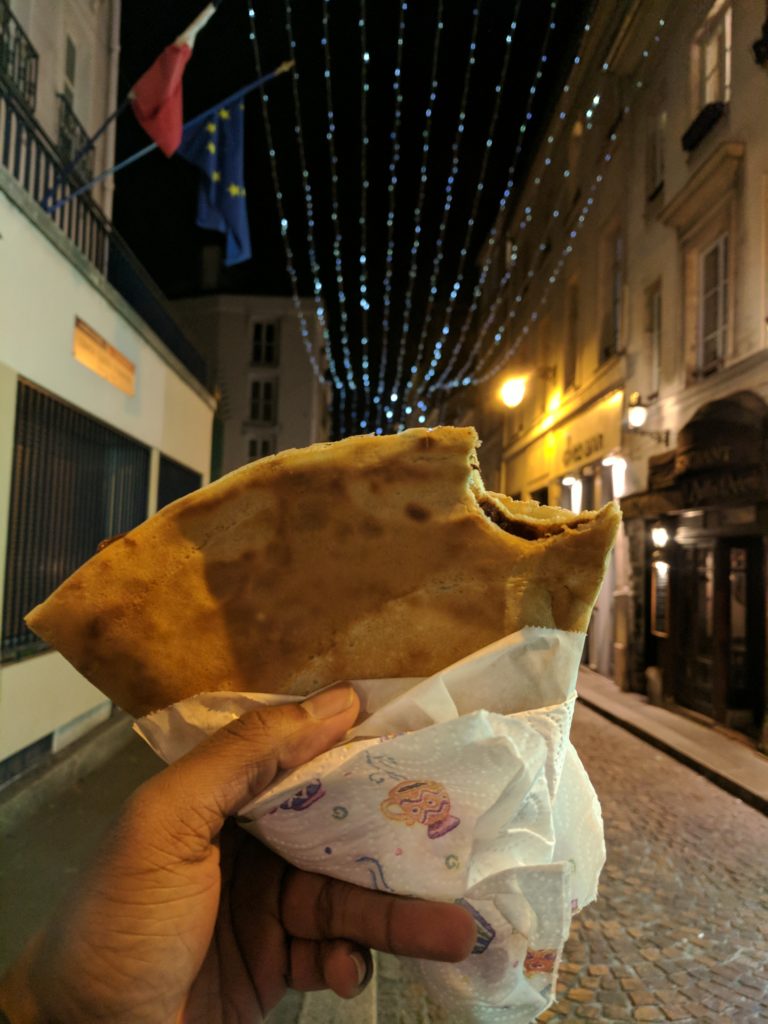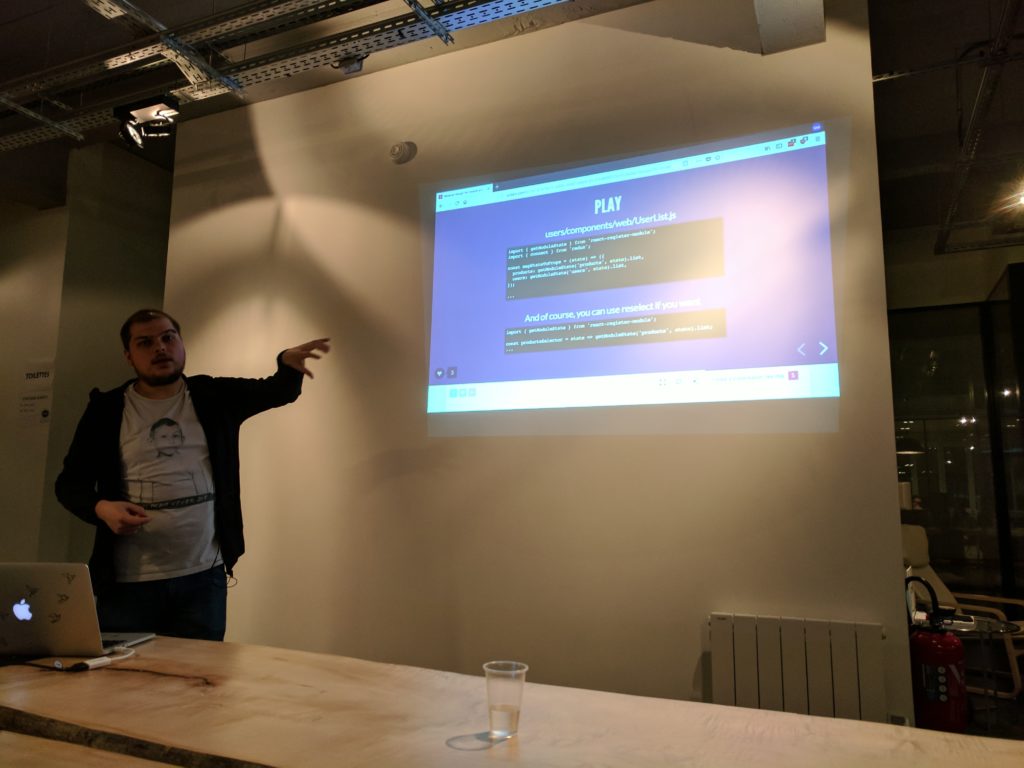Update: Here is a video of my progress towards the end of my challenge.
Salut de Paris!
Today marks the 25th day of my “50 days of French” challenge. This halfway update will be split into three parts, what I’ve done so far, how I’ve used my French, and what I intend to do for the remainder of the challenge.
So far…
In my previous post outlining my challenge, I said I was going to focus on a few key thematic areas for my study, including transportation, shopping, food. I decided I was going to set milestones for completion (i.e., I can say I’ve learned “food” sufficiently when I can order a meal completely in French). When I said this, I thought that meant I would go through section by section and memorize the relevant words and phrases – but that didn’t happen, for two reasons.
One is that it was too compartmentalized, and it felt like a chore to memorize all these different phrases. If there’s anything I know about language learning, it’s that it has to be fun and interesting, otherwise it gets really boring. I quickly switched out of this because this method….
Used too much English. I started reading Gabriel Wyner’s blog Fluent-forever.com, which advocates avoiding the use of English in learning vocabulary. Wyner, a former opera singer, learned several languages to fluency without the use of English. The first thing he does is to learn the pronunciation of each language, and then assembles a 625-item vocabulary list of words that will show up frequently, and are easy to picture (things like apple and dog rather than apricot and iguana). He then creates flashcards for all of those words in the target language, and then uses Anki to learn them (Anki is a spaced repetition software that shows you trouble cards more often and easy cards less often).
I largely avoided my phrasebook, and started using Wyner’s method. I have about 329 cards in my French Anki deck , and have been adding more words as I get the chance. To stay motivated, I also look up French songs and try to include some words and phrases from the lyrics. This keeps the process interesting, because I’m actually understanding native material.
Trois Anecdotes – How I’ve Used my French
Besides small talk with the neighborhood grocer, simple dialogue with wait staff and small conversations with the French speaking staff at my study abroad center, there are three situations where I’ve used my French that have stuck out.
La 1eme Ancedote – Le Franglish
I’ve noticed that nothing motivates me to study a language (or anything) harder like realizing how little you know. So last Sunday I went to a Franglish meetup, a language exchange event in which you are paired with a French speaker to have a 15 minute conversation, half of which is in English and half in French. I’ll admit that I walked in pretty cocky for someone who had learned to pronounce “le pain” properly that same week. My first conversation (before the language exchange begin) was with a Dutch women who was learning French for her job with Air France. She was in revenue management, a position that optimizes freight prices to make money (probably). She spoke slow, so I understood her well. My first real conversation had me paired with another English speaker (because too many of us showed up), and I could follow along well with that. Things went downhill when I had my first one on one conversation with a native French speaker.
My accent suddenly got much worse, and words that I previously could pronounce become incomprehensible. I had basically ignored verb conjugations and grammar, even simple constructs like “I am going to….”. I had a really hard time expressing myself, but I was able to follow some conversations if both parties spoke slowly (and happened to be talking about something I knew about in English). That meetup motivated me to double down on grammar and conjugations, and was actually a lot of fun. It was exhausting though – every conversation was mentally taxing as I really had to listen to understand.
I rewarded myself with a crêpe after that one
La 2eme Anecdote – Le React Native
For a while, I’ve been in a Facebook group called React Native Community on Facebook, despite never having written more than about 12 lines of code in React Native. React Native is actually pretty cool, it allows developers to use the same code for both Android and iPhone apps, preventing people from having to learn how to code in both natively. I just haven’t gotten around to learning it.
Someone posted about a React Native meetup that was happening in Paris, albeit entirely in French. I figured it would be a really good way to pick up more French, since I knew a little bit about CS. The night before our 7:30 AM trip to Bordeaux, I made my way to Comet, a startup for freelancers in the 11th arrondisement. I walked up to check in table, where a member of the staff asked me a question in French (that I didn’t understand). Stumbling to explain that I didn’t speak much French and that I was there to learn, I managed to get myself inside and without paying (the event was free).
The startup itself looked like the startups I had seen in Tel Aviv over the summer – sleek, clean and modernist design with muted shades of tan, gray, and brown. There was even a dog walking around. The presentation itself was in French, but the slides were in English so I could follow along. I noticed that I didn’t pick up that much new vocabulary from the presentation or from the conversation I had with anyone there – I mostly reinforced words that I already knew (like partager, avoir, besoin de, etc). I could pick up a lot of cognates from the presentation as well – they were words that I knew in English or Spanish but pronounced with a French accent.
I tried explaining what my major and minor was to the guy next to me, and I think he was trying to say that my CS minor would help my PPE (Philosophy, Politics, Economics) major. I thought he was confused at how you can have two different concentrations, and I, the proud and righteous American, tried explaining that you can have a minor that’s different than the major. Oops.
La 3eme – La traite négrière à Bordeaux
This weekend I took the TGV as part of our program wide study tour to Bordeaux. Ç’était trés cool. Europe does trains really well.
Besides the wine, Bordeaux also has a reputation for being the second largest port involved in the slave trade, after Nantes. One man, Karfa Diallo, has been trying to educate the public about this history through his organization, Mémoires et Partages. He gives guided walking tours of Bordeaux, pointing out remnants of the slave trade history in the limestone structures of the ville.
I signed up for his tour earlier that week, despite the fact that it was entirely in French. I spent the entire week leading up to it reading as much of the (French) Wikipedia page on the Bordeaux slave trade as I could, and watching French videos on the history of the slave trade and Bordeaux. Because of this work (and the fact that he none of us were native French speakers and spoke in simpler vocabulary), I was able to understand almost all of his talk. That means I’m at a point in French where I can understand what I hear, given I know and am prepared for what I’m going to hear. Super.
Now what?
I’m pretty happy with the progress I have so far, but now comes the hardest part of the process – which is avoiding complacency. I know it can be really easy for me to either think that I’ve learned enough and further study isn’t necessary, or get frustrated that I’m not getting the huge increases in competency with each hour of study (because of the law of diminishing returns) that I did with my first couple hours. I need to finish making the 625 word deck, get feedback on my pronunciation, and begin learning conjugations and “connector” words. Most importantly, I’m at a point where I need to continue to speak French, whether it be to native speakers or other more experienced learners, in order to solidify the concepts I’ve already learned.
I hope to have the entire 625 word deck built by Friday February 2nd, and I hope to have reviewed every word on it once before I end this challenge on February 17th. I don’t want to commit to any plans of what to do after completing the deck, since I will probably learn more about the process as I go on. However, I know I probably want to get a haircut in French at some point, and generally try to speak to as many natives as I can (preferably on camera so I can have some record of my ability).
Au revoir!

